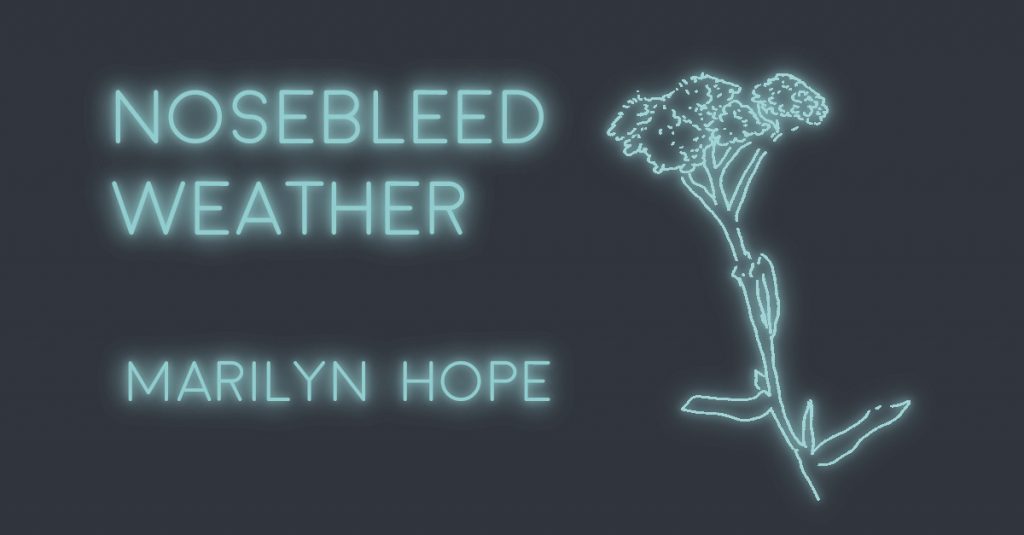
NOSEBLEED WEATHER by Marilyn Hope
Twelve-year-old Tibby Wallace takes the winter with him when he dies, but it's an act of rage. Summer scrapes through the valley overnight. Pollens convulse, lakes flood. Hundreds of snowshoe hares wear their December-whites in the sudden verdure; easy prey for owls, foxes, Mazzie Mako's feral cats. Soft, torn bodies everywhere. Tibby evokes eight-foot-tall stalks of hogweed from every ribcage, furious and toxic to the touch. But it's the yarrow that spells murder to me and Cricket.
"Never seen anything natural grow in such straight lines," Cricket says, studying the row of rusty blossoms that slit across the town limits like papercuts. "Earth don't plant in processions."
"Speaking of processions," I say, nodding to the single-lane road. Mrs. Wallace is driving back from the cemetery in far-off Stanton in her battered station wagon, heading the autocade at a crawl. Everyone's still got their winter tires on. Wallace rolls down her window, melting snow clinging to the tulle veil of her fascinator: she must've stood graveside for a very long time.
"What's all this?" Wallace asks. "Hemlock?"
"Yarrows," says Cricket. "Also known as 'soldier's woundworts' or 'sanguinaries.'"
"All right, Policegirl Posy. What they mean?"
"Mean he's angry." Cricket's thick black hair hangs heavy with sweat and rain. Tibby has been tantruming short storms and grueling sun in turn across the 5.80 square miles of our town all day. "Mean there's something else he wants us to see."
"Always got to have the final word, my boy," says Wallace. She and Tibby lived in a small house full of fatigue. They were hard-eyed but shy, both of them better hiders than seekers. Mrs. Wallace's hands are all knuckle as she tightens them around the steering wheel, so hard that the old leather cracks. "We following through or not?"
Cricket and I get back into the squad car and hit the siren. We're in haphazard plainclothes for today's mercurial weather. I’m wearing a denim romper and snow boots. Cricket’s in a sage-colored button-down, men's trousers, and a disposable rain poncho. Badges on ball chains circle our necks.
"Seen this before," Cricket tells me, dodging hogweed as we drive. "My neighbor's daughter in Cheongsando went missing one spring. Found the body surrounded by endangered musk deer, the kind that live in the boreal forest, right there in the island green. They died so quickly. Fangs everywhere, like punctuation marks. But for a spell, they brought the taiga with them. Jezo spruce and bog rosemary and fireweed—"
"You know your plants," I say, startled.
"I know everything that's got a place," says Cricket. "And I know a pointed finger when I see one. That girl laid dahurian larch all around the house of the man who killed her. I didn't have the seniority to convict him then, but I've got the numbers and the shadows to back me here. Not that I think Tibby'll have left much for us to fingerprint. If this sun is any indication."
Sweat slips down our temples. Cricket pokes the AC vents open.
"Hell-hot," she says.
By the time we reach the house at the end of the yarrow, tiny red petals have swallowed the doctor entirely—a woman's silhouette tethered to the ground by a net of stems. Cricket and I draw closer on our tiptoes, seesawing as we try not to step on the flowers’ open faces. So many and so close, the copper clusters of florets smell full and peppery, like someone's cooking. Spindly white spider lilies canopy her expression, rising from her eyes and nostrils and mouth, as if in censorship.
Cricket presses one hand to the doctor's wrist for a pulse, then pulls it back with her middle finger raised toward the ceiling.
"Oh, boss, don't pout," I say. "Let the boy have his revenge."
"And what pretty revenge it is," says Cricket, sullen. "Just wish the achillea came with answers."
But it doesn't. Tibby had been back in the phlebotomy chair the last afternoon we spoke. I asked what they were testing for this time, and he replied in that voice of his, dry as dust: “Toxins. The really-hard-to-find ones.”
He liked us—Cricket's terse concern and thin mouth, my cheerful banter, the silly things I could do with my eyebrows. The way we believed him when he said someone was poisoning him. “I wanted to do what you two do”, he said, the doctor tapping gently at his inner elbow. “I wanted to keep listening after everyone else gives up.”
There was nothing we could say to that, his resignation, our failure. I watched the test tubes fill one after the other, his tiny veins bulging with blood. Almost beautiful.
“Like branches,” I said.
“Like roots,” Tibby replied.
Outside, Mrs. Wallace honks her horn twice. She and the funeral cortege are pulling up to see the damage. I can address the grief in her expression—there are enough ways to say "I'm sorry" and "I know you loved him"—but I can think of no acceptable reply to the fury and shame that twist her mouth when she sees where the flowers are leading her.
Cricket and I walk to the front porch and stand shoulder-to-shoulder, shivering. Now that we've found the body, Tibby has released the weather again, fast as a snap of the fingers. Not far beyond the final car, it's beginning to snow, winter creeping up on the mourners like a slow, slender needle.
